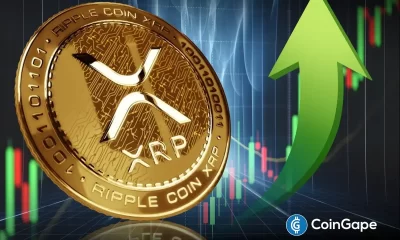Bitcoin
Michael Saylor Doesn’t Understand Bitcoin
Published
4 months agoon
By
admin


On a recent episode of the Galaxy Brains podcast, Michael Saylor made the case that bitcoin isn’t a currency and that it’s best to think of it as capital and capital only.
He also shared that Tether (USDT) and Circle’s USD Coin (USDC) are the real digital currencies and unveiled his “evil genius strategy” (his own words) to get the world to adopt the U.S. dollar stablecoins as opposed to bitcoin.
In this Take, I’ll cite some of Saylor’s own words from the podcast before breaking down why many of the points he made are off base.
Capital, Not Currency
“It’s not a currency, it’s capital,” said Saylor about halfway through the episode.
“You just have to come to grips with it — it is not digital currency. It is not cryptocurrency. It is digital capital. It is crypto capital,” he added.
I searched the Bitcoin Whitepaper to see how many times the word “capital” showed up.
It isn’t mentioned once.
However, in both the title and abstract of the text, bitcoin is referred to as “electronic cash.” While cash can of course also be capital, it’s not only capital. To think of bitcoin only as capital is to deny certain of its most essential properties — like the ability to use it to transact with anyone anywhere in the world permissionlessly.
To deny bitcoin as a currency is to deny a large part of its value proposition. Bitcoin’s roles as a Store of Value (SoV) and a Medium of Exchange (MoE) are inextricably linked. For more on this, I’d advise you (and Michael Saylor) to read Breez CEO Roy Sheinfeld’s piece “Bitcoin’s False Dichotomy between SoV and MoE”.
As the episode proceeded Saylor continued to (poorly) make the case for why bitcoin is capital and not currency.
“There are a lot of maxis who are like ‘No, we want it to be a currency. We want to be able to pay for coffee with our bitcoin. Pay me in bitcoin,’” he said. “It’s like ‘Pay me in gold. Pay me in a building. Pay me with a slice of your professional sports team. Pay me with a Picasso.’”
It’s actually not like that at all.
Sure, bitcoin is scarce, somewhat like gold, Manhattan real estate, sports teams or famous paintings, but it has a number of other properties that make it far different from any of these other assets.
To illustrate a dimension of that point, I’ll cite my colleague Alex Bergeron:
I invite anyone who thinks Bitcoin is like gold to launch a custodial gold wallet.
I’ll wait.
— Alex B (@bergealex4) December 22, 2024
And then Saylor cited — wait for it — Fed Chair Jerome Powell’s take on bitcoin in efforts to drive home his point that bitcoin is capital, not currency.
“The reason bitcoin rallied past $100,000 is because Jerome Powell on stage said to the world, bitcoin does not compete with the dollar, it competes with gold,” he said.
Oddly enough, Saylor said this without acknowledging that the man who said this is the head of the institution that Bitcoin should theoretically replace.
USDT, Not BTC
In the interview, Saylor also drove home the point that the real digital currencies are U.S. dollar stablecoins.
“The cryptocurrency, the digital currency, is Tether (USDT) and Circle (USDC),” he said. “It’s a stablecoin U.S. dollar — that’s the digital currency.”
This is when I started to get nauseous.
For those who don’t yet know this, Bitcoin came into the world in the wake of the Great Financial Crisis of 2008, when the U.S. government in conjunction with the U.S. Federal Reserve opted to print U.S. dollars en masse (debase the currency) to bail out failing banks, the burden of which was laid both on the U.S. taxpayers and U.S. dollar holders worldwide.
Bitcoin is a decentralized money that was created as an alternative to the U.S. dollar and all other fiat currencies. Trying to convince people that bitcoin is not this is disingenuous at best, deeply manipulative at worst.
But this isn’t even the worst of what Saylor had to say on the episode.
He went on to propose that the banks that got bailed out in the 2008 financial crisis issue their own stablecoins, which would help prop up the U.S. debt market.
“They ought to just create a normal regime to issue digital currency backed by U.S. treasuries,” said Saylor.
“The U.S. ought to have a framework so Tether relocates to New York City. That’s what you want, right? And then you ought to basically have a free-for-all where JP Morgan or Goldman Sachs can issue their own stablecoin,” he added.
No, Michael Saylor, that’s not what I want. In fact, it’s very far from what I want.
I don’t want Tether anywhere near New York City (my hometown) and I don’t want JP Morgan and Goldman Sachs issuing U.S. dollar stablecoins that they control, essentially the equivalent of CBDCs.
When I think about Goldman Sachs, the first thing that comes to mind is award-winning writer Matt Taibbi’s description of the institution from his New York Times bestseller Griftopia.
“The first thing you need to know about Goldman Sachs is that it’s everywhere,” began Taibbi in the book. “The world’s most powerful investment bank is a great vampire squid wrapped around the face of humanity, relentlessly jamming its blood funnel into anything that smells like money.”
Goldman Sachs, much like the U.S. Federal Reserve, is an institution that sucks the life force from humanity. Bitcoin was designed to take power away from such institutions, not strengthen them.
Toward the end of the episode, Saylor laid out his master plan for bitcoin and U.S. dollar stablecoins.
Here it is:
“Everybody outside the U.S. would give their left arm to be capitalized on U.S. bonds. So, my strategy would be — and I really think it’s an evil genius strategy; it’s so good that our enemies would hate us, but our allies would complain, too. And the U.S. would make $100 trillion in a heartbeat.
Here’s the strategy: You dump gold, demonetize the entire gold network. You buy bitcoin — 5 million or 6 million bitcoin — and you monetize the bitcoin network. All the capital in the world, sitting in Siberian real estate or Chinese natural gas or every other currency derivative that’s held as a long-term store of value — Europeans, Africans, South Americans, Asians, they all just dump their crappy property and their crappy capital assets and they buy bitcoin. The price of bitcoin goes to the moon.
The U.S. is the big beneficiary. U.S. companies are the big beneficiary. And while you’re doing that, you normalize and support digital currency, and you just define digital currency as the U.S. dollar backed by U.S. dollar equivalents in a regulated U.S. custodian that’s audited. What happens next?
$150 billion of stablecoins goes to $1 trillion, $2 trillion, $4 trillion, $8 trillion, probably somewhere between $8 and $16 trillion, and you create $10 to $20 trillion of demand for U.S. sovereign debt.
While you’re taking away a little bit of the demand because the capital asset of bitcoin grows, you’re adding back the demand to back the stablecoin. [The digital U.S. dollar then] replaces the CNY, the Rubble. It replaces every African currency. It replaces every South American currency. It replaces the euro.
If you really believe in U.S. world reserve currency and U.S. values, every single currency in the world will actually just merge into the U.S. dollar if it was freely available.”
At this point, I stopped listening to the episode and projectile vomited all over the New York City subway car in which I was sitting.
I didn’t come into the Bitcoin space to help the U.S. run a scheme in which it acquires a large percentage of the bitcoin while hooking the world on its trash currency, and it deeply saddens me that someone that many in the Bitcoin space look up to would come up with such a conniving plan.
Bitcoin Is Money
Bitcoin is money. It’s a type of money that cannot be censored or debased that has spectacularly grown in value over the past decade, making it one of, if not the most, powerful tool ever created for individuals.
To think of it as anything less, or to try to convince people that a new iteration of an incumbent version of money is better than it, is to be deeply misinformed.
While bitcoin is capital, that’s not all it is, and please don’t let Michael Saylor or anyone else convince you otherwise.
This article is a Take. Opinions expressed are entirely the author’s and do not necessarily reflect those of BTC Inc or Bitcoin Magazine.
Source link
You may like


‘Big Short’ Investor Steve Eisman Derisks, Says Stock Market Volatility Will Be Here for a While


Dow drops over 500 points as UnitedHealth tanks, Fed tensions weigh on markets


Gold Is Still the Safe-Haven King, While Bitcoin Loses Out: JP Morgan


Dogecoin Price Breakout in view as Analyst Predicts $5.6 high


Bitcoin (BTC) Price in Standstill at $85K as Trump Increases Pressure on Fed’s Powell


Ripple acquisition Hidden Road secures FINRA registration
Bitcoin
Bitcoin (BTC) Price in Standstill at $85K as Trump Increases Pressure on Fed’s Powell
Published
6 hours agoon
April 17, 2025By
admin
Bitcoin (BTC) was treading water just below $85,000 late Thursday as tensions between U.S. President Donald Trump and Federal Reserve Chair Jerome Powell added another layer of uncertainty for investors.
Markets dipped on Wednesday after hawkish comments from Powell, who criticized Trump’s tariffs policy, saying that it would likely result in a slowing economy and rising prices — what economists call “stagflation.” In his remarks, Powell made clear his larger focus for now would be on prices, suggesting tighter Fed policy than otherwise thought.
Trump — who nominated the former investment banker and lawyer as Fed chair during his first term (Powell was given a second four-year term by President Biden) — has expressed his displeasure with Powell since retaking the White House. Powell, though, who is set to remain atop the central bank until May 2026, has repeatedly stated his determination to finish his term and suggested the president has no standing to fire him.
On Thursday, the WSJ reported that Trump has been privately discussing firing Powell for months, according to people familiar with the matter. Former Fed Governor Kevin Warsh is reportedly waiting in the wings as Powell’s replacement, but Warsh has lobbied the president not to move against the Fed chair, according to the story.
Joining Warsh in that warning is Treasury Secretary Scott Bessent, who said the move could roil already shaky U.S. markets as the central bank is supposed to be independent from political influences.
Odds of Trump removing Powell this year on the blockchain-based prediction market Polymarket rose to 19%, the highest reading since the contract’s late January launch.
Trump’s comments came on the back of the European Central Bank (ECB) cutting key interest rates for the seventh consecutive occasion on Thursday as it warned of a deteriorating growth outlook.
More pressure on markets came from the latest Philadelphia Fed manufacturing index, published Thursday morning, which showed a nosedive in activity this month, sinking to its lowest level (-26.4) in two years. Meanwhile, the prices paid index climbed to its highest reading since July 2022, adding to concerns about the Trump administration’s large-scale tariff policy pushing the U.S. economy into stagflation.
The S&P 500 and tech-heavy Nasdaq stock indexes traded mostly flat during the day.
A look at the crypto market showed BTC and Ethereum’s ETH up 0.8% over the past 24 hours. Most assets in the CoinDesk 20 Index traded higher during the day, with bitcoin cash (BCH), NEAR and AAVE leading gains.

How bitcoin traders position amid heightened fear on Wall Street ?
Bitcoin has stabilized between $83k and $86k with traders chasing bullish bets while still seeking downside protection.
On Deribit, traders are actively chasing calls at the 90k to $100k strikes expiring in May and June, the exchange said in a market update Thursday. The demand for calls indicates expectations for a continued price rally.
Some of these bullish bets have been funded by premiums collected by selling put options.
At the same time, there has been renewed interest in buying put options at $80k expiring this month, representing preparations for potential price declines. Buying a put option is akin to purchasing insurance against price slides.
The diverse two-way flow comes as the VIX, Wall Street’s fear gauge measuring the 30-day implied volatility, still remains well above its 50-day average, despite the pullback from recent highs above 50.
The VIX is warning that the macro situation is still unraveling rather than resolving, the exchange said on X.
Source link
Bitcoin
How Do We Protect Bitcoin From Quantum Computers? Not With A Joke
Published
8 hours agoon
April 17, 2025By
admin

Recently, Project Eleven (a quantum computing research group) announced a 1 bitcoin reward for the first team able to complete a challenge to demonstrate breaking a ECC (elliptic curve cryptograph) key using Shor’s algorithm on a quantum computer.
The deadline for this challenge is April 5th, 2026, meaning in order to qualify for the prize a team must demonstrate breaking a key pair it must be done before that deadline.
This is frankly a completely absurd and meaningless prize for a number of reasons, the first of which is the deadline of just under a year from today. Even highly optimistic projections about the progress of quantum computing put the timeline of practically achieving such a goal at more like 5-10 years. Expecting a workable proof of concept demonstration that actually breaks a keypair in a single year is pretty laughable at face value, even if you do view quantum computing as a material threat in the short term.
Next is the factor of economic incentives. A single bitcoin is currently worth approximately $80,000. That is frankly not a lot of money in the grand scheme of things. Especially when it comes to the application of a cutting edge technology like quantum computing that can perform an entire class of computation exponentially faster than a classical computer. Imagine how much more valuable things could be done with a working quantum computer.
You could eavesdrop on internet connections regardless of TLS, breaking secure connections to banks, equity brokerages, private corporate networks not using post-quantum cryptography. You could break every private messenger application on the planet, you could decrypt any PGP encrypted message sent over email that you knew the public key for. You could break the entire DNS system’s certificate authority hierarchy, allowing you to impersonate any server in the world a user tries to connect to.
All of these things have immeasurable value beyond just a mere $84,000. Why on Earth would someone with a working quantum computer publicly reveal that fact to claim a single bitcoin when they could take advantage of all these other things they would be capable of doing?
Okay, let’s sweep all of those possibilities aside and pretend the entire world magically migrates to post-quantum cryptography aside from Bitcoin. It still makes no sense to try to publicly claim this prize if you have a functional quantum computer.
Let’s assume you have a barely performant enough quantum computer, that it takes a decent amount of time to crack a single key. How many bare public keys are there securing 50 BTC outputs from the first mining epoch? THOUSANDS of them. Why on Earth would you crack one, and then go tell everyone publicly to claim a single bitcoin? You would just try to crack as many of those early coinbase rewards as possible before people detected you.
Finally, the timetable on its own is just absurd. Quantum computers currently are not even capable of factoring prime numbers that people can do themselves in their heads mentally. In a single year the technology is going to jump from that to cracking Bitcoin keys? That’s absurd.
So what the hell is the point of this prize except some publicity stunt? It’s utterly meaningless as a serious bounty to function as a canary in the coalmine for us, no matter how concerned or unconcerned you are with the timeframes of quantum computers as a threat.
This bounty is a joke.
This article is a Take. Opinions expressed are entirely the author’s and do not necessarily reflect those of BTC Inc or Bitcoin Magazine.
Source link
bear market
Hints of Long-Term Crypto Bear Market Showing Up, According to Coinbase Analyst
Published
18 hours agoon
April 17, 2025By
admin
A top Coinbase researcher says signs of a long-term crypto bear market are starting to emerge.
David Duong, the global head of research at Coinbase, says in a new analysis that the 200-day moving average (MA) indicates bearishness for Bitcoin (BTC) and the Coinbase 50 Index (COIN50), which tracks the performance of the 50 largest digital assets by market cap.
“As Bitcoin’s role as a ‘store of value’ continues to grow, we think a holistic evaluation of crypto’s aggregate market activity will be needed to better define bull and bear markets for the asset class, particularly as we’re likely to see increasingly diverse behavior in its expanding sectors.
Nevertheless, both BTC and the COIN50 index have recently broken below their respective 200-day MAs, which signals potential bearish long-term trends in the overall market. This is consistent with the fall in the total crypto market cap and decline in venture capital funding for this space, hallmarks of a potential crypto winter rising.”
The analyst says if a crypto bear market does set in, a bullish reversal could start taking shape sometime between July and September.
“Thus, we think this warrants taking a defensive stance on risk for the time being, though we still believe that crypto prices may be able to find their floor in mid-to-late 2Q25 – setting up a better 3Q25.”
Follow us on X, Facebook and Telegram
Don’t Miss a Beat – Subscribe to get email alerts delivered directly to your inbox
Check Price Action
Surf The Daily Hodl Mix
 

Disclaimer: Opinions expressed at The Daily Hodl are not investment advice. Investors should do their due diligence before making any high-risk investments in Bitcoin, cryptocurrency or digital assets. Please be advised that your transfers and trades are at your own risk, and any losses you may incur are your responsibility. The Daily Hodl does not recommend the buying or selling of any cryptocurrencies or digital assets, nor is The Daily Hodl an investment advisor. Please note that The Daily Hodl participates in affiliate marketing.
Generated Image: Midjourney
Source link

‘Big Short’ Investor Steve Eisman Derisks, Says Stock Market Volatility Will Be Here for a While

Dow drops over 500 points as UnitedHealth tanks, Fed tensions weigh on markets

Gold Is Still the Safe-Haven King, While Bitcoin Loses Out: JP Morgan

Dogecoin Price Breakout in view as Analyst Predicts $5.6 high

Bitcoin (BTC) Price in Standstill at $85K as Trump Increases Pressure on Fed’s Powell

Ripple acquisition Hidden Road secures FINRA registration

Ethereum Whales Offload 143,000 ETH In One Week – More Selling Ahead?

How Do We Protect Bitcoin From Quantum Computers? Not With A Joke

OKX Goes Live In The US After Setting Up New Headquarters in San Jose, California

Stanford’s AI research lab to use Theta EdgeCloud for LLM model studies

Central African Republic Solana Meme Coin Jumps as President Fuels Rumors of Revival

Will Shiba Inu Price 3x?

Bitcoin Cash (BCH) Gains 4.2%, Leading Index Higher

Bybit shuts down four more Web3 services after axing NFT marketplace

Aptos To Continue Moving In ‘No Man’s Land’ – Can It Reclaim $5?

Arthur Hayes, Murad’s Prediction For Meme Coins, AI & DeFi Coins For 2025

Expert Sees Bitcoin Dipping To $50K While Bullish Signs Persist

Aptos Leverages Chainlink To Enhance Scalability and Data Access

Bitcoin Could Rally to $80,000 on the Eve of US Elections

3 Voting Polls Show Why Ripple’s XRP Price Could Hit $10 Soon

Crypto’s Big Trump Gamble Is Risky

Sonic Now ‘Golden Standard’ of Layer-2s After Scaling Transactions to 16,000+ per Second, Says Andre Cronje

Institutional Investors Go All In on Crypto as 57% Plan to Boost Allocations as Bull Run Heats Up, Sygnum Survey Reveals

Ripple-SEC Case Ends, But These 3 Rivals Could Jump 500x

The Future of Bitcoin: Scaling, Institutional Adoption, and Strategic Reserves with Rich Rines

Has The Bitcoin Price Already Peaked?

A16z-backed Espresso announces mainnet launch of core product

Xmas Altcoin Rally Insights by BNM Agent I

Blockchain groups challenge new broker reporting rule

I’m Grateful for Trump’s Embrace of Bitcoin
Trending

 24/7 Cryptocurrency News5 months ago
24/7 Cryptocurrency News5 months agoArthur Hayes, Murad’s Prediction For Meme Coins, AI & DeFi Coins For 2025

 Bitcoin3 months ago
Bitcoin3 months agoExpert Sees Bitcoin Dipping To $50K While Bullish Signs Persist

 24/7 Cryptocurrency News3 months ago
24/7 Cryptocurrency News3 months agoAptos Leverages Chainlink To Enhance Scalability and Data Access

 Bitcoin5 months ago
Bitcoin5 months agoBitcoin Could Rally to $80,000 on the Eve of US Elections

 Ripple Price4 weeks ago
Ripple Price4 weeks ago3 Voting Polls Show Why Ripple’s XRP Price Could Hit $10 Soon

 Opinion5 months ago
Opinion5 months agoCrypto’s Big Trump Gamble Is Risky

 Altcoins3 months ago
Altcoins3 months agoSonic Now ‘Golden Standard’ of Layer-2s After Scaling Transactions to 16,000+ per Second, Says Andre Cronje

 Bitcoin5 months ago
Bitcoin5 months agoInstitutional Investors Go All In on Crypto as 57% Plan to Boost Allocations as Bull Run Heats Up, Sygnum Survey Reveals


